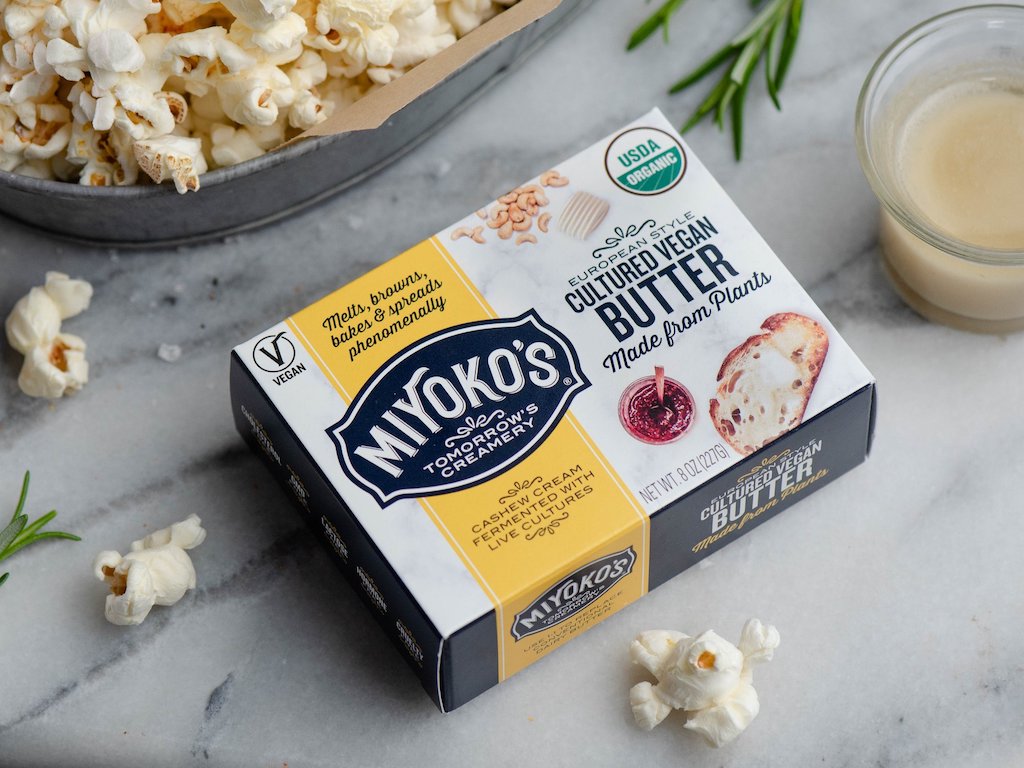
I wanted to write about edible cookie dough. Then, I got a press release for an award-winning vegan camembert, learned that San Francisco vegan dairy brand Miyoko’s Creamery won the right to label its oat-based butter “butter” and saw vegan protein brand Lightlife buy a full-page ad in the New York Times urging Beyond Meat and Impossible Foods to “clean up” their ingredient list. In such a crazy summer, why are vegan foods getting so much attention?
Mass-culture veganism is approaching a crossroads. The diet is removing its ultra-stringent, fringe reputation -- no more “I could never live without cheese” exclamations. As the diet’s social positioning role shifts, long-standing adherents are needing to reassess their relationship with veganism. This shift is causing friction amongst brands, between brands and customers and between brands and regulatory structures.
Naming a product has proved to be one of the most powerful tools to spin plant-based products mainstream. Labels help determine where items are placed in grocery stores. The arguments over plant-based milks typify this conflict. While the milk lobby has the money to push back against non-dairy milks, they only care when alt varieties impinge on milk sales. For a long time, this wasn’t a problem. Soy, rice and even hemp milks have been around for decades, but they were sold in shelf-stable cartons at natural food stores. It was a limited market. When almond milk became popular in the 2010s, companies like Blue Diamond and Califia Farms realized that sales increased when their cartons were placed in the refrigerated case next to conventional milk. A recent study confirms the same is true for alt-meats. Shoppers aren’t as loyal to conventional formulations as they are loyal to conventional names.
Strictly following this logic, Miyoko’s could avoided conflict and labelled its oat-based butter as margarine, but the negative associations that the high-oleic spread has accrued over the years are likely to dissuade customers contemplating a vegan diet for health reasons -- nearly half of vegan-curious current meat-eaters. And once you taste their cultured oat alt-butter, you’ll realize that its organoleptic properties scream butter. It’s salty and savory with a complexity often limited to the elite cultured French versions. Just like goat milk yogurt is slightly different from cow milk yogurt, but fulfils the same dietary role, Miyoko’s butter is made with a liquid derived from oats, but occupies the same culinary niche as butter made from cow’s milk.
Yet the idea that a vegan product must replicate the animal-derived on to warrant the same name pigeonholes attention-worthy vegan foods into replicating current eating structures and the nutrition gaps that come along with them. This is the attitude that Lightlife was attempting to call out when it asked Impossible Foods and Beyond Meat to reduce the number of ingredients in their mock meat formulations. The brand, which is owned by Canada’s Maple Leaf Foods, ran a full-page ad in the New York Times and the Wall Street Journal that urged the alt-meat wunderkinds to reject highly-processed ingredients. While Impossible Foods and Beyond Meat are easy targets thanks to their success, focusing on these popular brands overlooks the fact that they probably shouldn’t be cornerstones of the next-gen vegan diet.
The economic engine behind today’s mass-market(ish) veganism is reproduction of traditional eating structures separated from traditional ingredients and processes. Duplication drives demand. But this demand is limited to a few dishes deemed appealing enough to warrant replication.
Plant-based camembert is not one of these mass-market vegan dupes, but it does demonstrate how veganism is attempting to hold onto its exclusive identity. Brooklyn-based company Rind uses live active bacteria and a non-dairy base to culture plant-based versions of soft French cheeses. As the name indicates, the company is proud of its rinds, which are safe to eat and boast unique, funky aromas that are similar to, yet different from, conventional soft cheeses. Rind offers a conception of veganism that sees a plant-based alternative served to friends with wine at a dinner party. It’s elite and controlled.
I believe that the tension that we’re seeing between companies like Lightlife -- an old school vegan company that’s been in the tempeh and tofu game for 40 years -- and next-gen alt-meat producers like Impossible Foods and Beyond Meat is one that sits between the elite and mass-conceptions of vegan food. Impossible Foods and Beyond Meat are targeting mass consumers and tastes. They replicate popular eating patterns without using animals to make fast food a halfway-healthy option. Meanwhile, companies like Rind and Miyoko’s are reimagining high-end food products with new ingredients while still retaining traditional processes, like fermentation. When we talk about veganism as a monolith, we miss out on these nuances. These nuances are what make the category a vital space, where consumers and companies select foods that best express their identity, whether mass or elite.
I hope that the industry can find a middle ground, where plant-based products are seen as an ordinary alternative to conventional, animal-based ones. Where you can have a product that aims to replicate a fast food burger or one that offers an elevated dinner party snack. I want to be able to eat tempeh and a Beyond sausage. This is going to be a lot to ask for in a market where attitudes toward health and diet remain staunchly black-and-white, good-or-bad. The question that I’d like to see being asked isn’t “is this a healthy alternative” but rather “does this alternative serve the eating occasion I want to have now.”
——-
FUN FACT: There’s a research company in Australia that’s using cellular agriculture to produce cruelty-free versions of exotic meats, like kangaroo and zebra. I’m excited for my first lab-grown burger or chicken nugget (which, researchers have told me, is the easiest to produce), but this brings the anticipation to a whole new level.